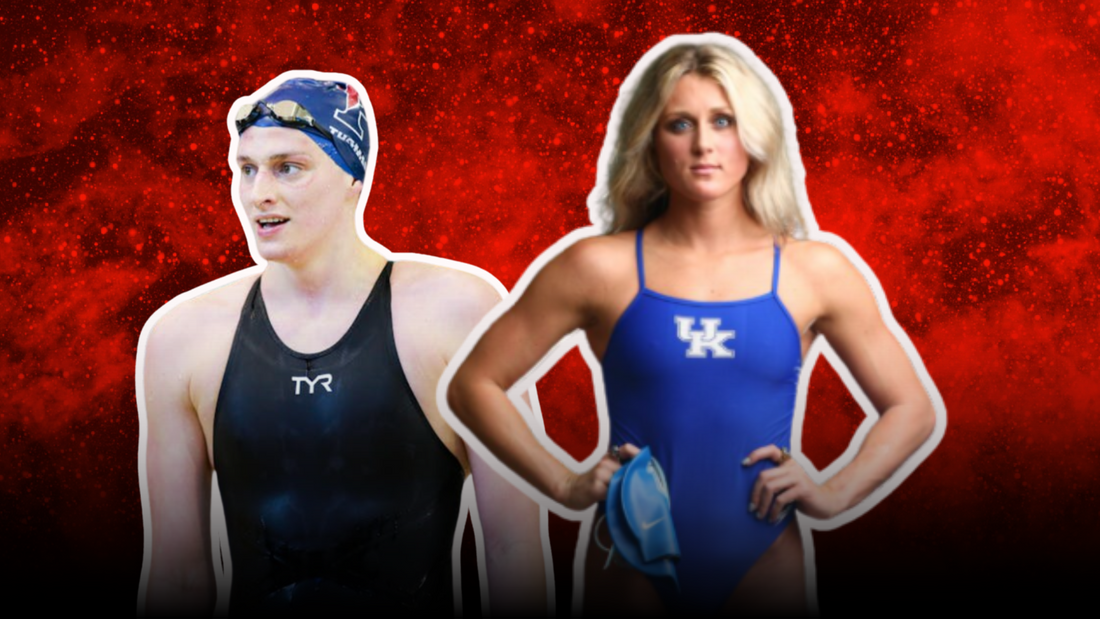
Inside the Explosive Riley Gaines vs. Lia Thomas Feud: What Really Happened Behind Swimming’s Biggest Controversy?
By Jayson Panganiban June 16, 2025 09:44
The rivalry between Riley Gaines and Lia Thomas has become one of the most polarizing and talked-about controversies in recent sports history, igniting fierce debates about fairness, gender identity, and the future of women’s athletics. What began as a competitive clash in the pool quickly spiraled into a heated public feud, drawing national attention and raising questions far beyond the swimming lanes.
The Origins: Competition and Controversy
Lia Thomas, a transgender swimmer who competed for the University of Pennsylvania, made history in 2022 as the first openly transgender athlete to win an NCAA Division I women’s swimming championship, capturing the 500-yard freestyle title. Before transitioning, Thomas competed on the men’s team, where her rankings were modest 65th in the 500-yard freestyle and 554th in the 200-yard freestyle. After transitioning and joining the women’s team, she surged to the top, tying with Riley Gaines for fifth place in the 200-yard freestyle at the NCAA Championships and winning the 500-yard freestyle.
Riley Gaines, a senior swimmer from the University of Kentucky, finished fifth in the 500-yard freestyle behind Thomas’s historic win. Gaines described the experience as “tragic and depressing,” voicing strong objections to Thomas’s participation in women’s events. She accused Thomas of “cheating in more ways than one” and claimed that Thomas “stole a national title from a hardworking, deserving woman.” Gaines’s frustration culminated in a $2 million lawsuit against Thomas, alleging fraud and emotional distress caused by what she views as an unfair competitive advantage.
Locker Room Tensions and Personal Attacks
Beyond the pool, the feud intensified over locker room access. Gaines publicly stated that she and other female swimmers were not given prior consent to share changing facilities with Thomas, a biological male standing 6-foot-4. Gaines recounted a distressing experience: “We turned around and there’s a 6’4” biological man dropping his pants and watching us undress. That to me was worse than the competition piece.” She likened the situation to “sexual assault” or “voyeurism,” highlighting the emotional toll and discomfort experienced by female athletes.
The conflict extended into social media and public discourse. Thomas’s spokesperson dismissed Gaines’s claims, calling her a “pampered child” and downplaying the competitive significance of Gaines’s finishes. Meanwhile, Gaines criticized ESPN’s decision to honor Thomas during Women’s History Month, labeling Thomas an “arrogant cheat” and accusing the network of being “spineless.”
Broader Implications and Public Reaction
The Gaines-Thomas feud has become emblematic of the broader debate surrounding transgender athletes in women’s sports. Advocates for Thomas emphasize inclusion and the importance of allowing transgender individuals to compete according to their gender identity. Critics, led vocally by Gaines, argue that physiological differences confer unfair advantages, undermining the integrity of women’s athletics.
Gaines has become a prominent voice for female athletes who feel marginalized, stating in a Fox News interview, “The majority of us female athletes are not okay with this trajectory and how it could end up in a few years.” She also revealed that many women share her concerns but remain silent due to fear of backlash.
The Aftermath and Ongoing Legal Battles
The dispute has not been confined to words. Gaines filed a $2 million lawsuit against Thomas, citing emotional harm and fraud. The legal battle is part of a larger wave of lawsuits and policy challenges involving transgender athletes and governing bodies like the NCAA. Meanwhile, Thomas lost a legal battle to compete in the 2024 Olympics, further complicating her athletic career.
The Riley Gaines vs. Lia Thomas feud transcends a simple sports rivalry; it encapsulates a cultural and ethical clash playing out on a national stage. Gaines’s outspoken criticism and legal actions reflect deep concerns about fairness and safety for female athletes, while Thomas’s journey highlights the challenges transgender athletes face in seeking recognition and inclusion. As the debate continues, the swimming world and sports in general remain at a crossroads, grappling with how to balance inclusion, fairness, and respect for all competitors.

































































